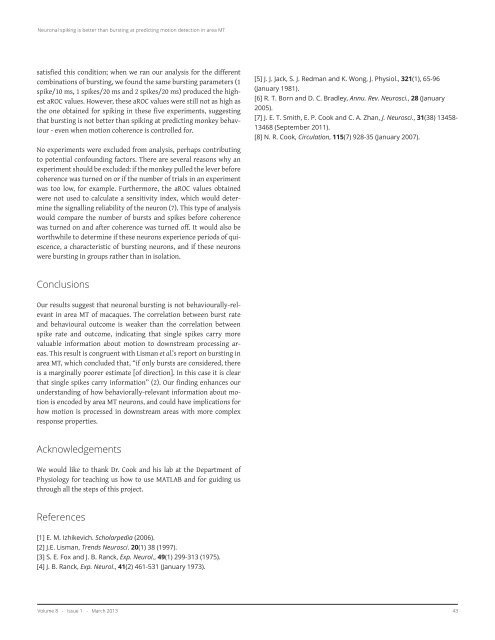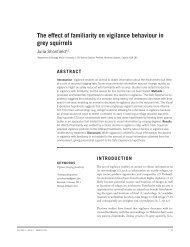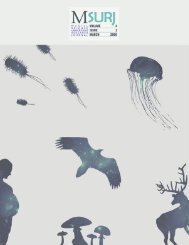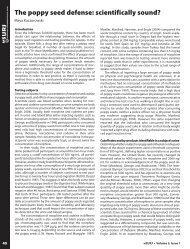the entire issue - McGill Science Undergraduate Research Journal ...
the entire issue - McGill Science Undergraduate Research Journal ...
the entire issue - McGill Science Undergraduate Research Journal ...
You also want an ePaper? Increase the reach of your titles
YUMPU automatically turns print PDFs into web optimized ePapers that Google loves.
Neuronal spiking is better than bursting at predicting motion detection in area MT<br />
satisfied this condition; when we ran our analysis for <strong>the</strong> different<br />
combinations of bursting, we found <strong>the</strong> same bursting parameters (1<br />
spike/10 ms, 1 spikes/20 ms and 2 spikes/20 ms) produced <strong>the</strong> highest<br />
aROC values. However, <strong>the</strong>se aROC values were still not as high as<br />
<strong>the</strong> one obtained for spiking in <strong>the</strong>se five experiments, suggesting<br />
that bursting is not better than spiking at predicting monkey behaviour<br />
- even when motion coherence is controlled for.<br />
No experiments were excluded from analysis, perhaps contributing<br />
to potential confounding factors. There are several reasons why an<br />
experiment should be excluded: if <strong>the</strong> monkey pulled <strong>the</strong> lever before<br />
coherence was turned on or if <strong>the</strong> number of trials in an experiment<br />
was too low, for example. Fur<strong>the</strong>rmore, <strong>the</strong> aROC values obtained<br />
were not used to calculate a sensitivity index, which would determine<br />
<strong>the</strong> signalling reliability of <strong>the</strong> neuron (7). This type of analysis<br />
would compare <strong>the</strong> number of bursts and spikes before coherence<br />
was turned on and after coherence was turned off. It would also be<br />
worthwhile to determine if <strong>the</strong>se neurons experience periods of quiescence,<br />
a characteristic of bursting neurons, and if <strong>the</strong>se neurons<br />
were bursting in groups ra<strong>the</strong>r than in isolation.<br />
[5] J. J. Jack, S. J. Redman and K. Wong, J. Physiol., 321(1), 65-96<br />
(January 1981).<br />
[6] R. T. Born and D. C. Bradley, Annu. Rev. Neurosci., 28 (January<br />
2005).<br />
[7] J. E. T. Smith, E. P. Cook and C. A. Zhan, J. Neurosci., 31(38) 13458-<br />
13468 (September 2011).<br />
[8] N. R. Cook, Circulation, 115(7) 928-35 (January 2007).<br />
Conclusions<br />
Our results suggest that neuronal bursting is not behaviourally-relevant<br />
in area MT of macaques. The correlation between burst rate<br />
and behavioural outcome is weaker than <strong>the</strong> correlation between<br />
spike rate and outcome, indicating that single spikes carry more<br />
valuable information about motion to downstream processing areas.<br />
This result is congruent with Lisman et al.’s report on bursting in<br />
area MT, which concluded that, “if only bursts are considered, <strong>the</strong>re<br />
is a marginally poorer estimate [of direction]. In this case it is clear<br />
that single spikes carry information” (2). Our finding enhances our<br />
understanding of how behaviorally-relevant information about motion<br />
is encoded by area MT neurons, and could have implications for<br />
how motion is processed in downstream areas with more complex<br />
response properties.<br />
Acknowledgements<br />
We would like to thank Dr. Cook and his lab at <strong>the</strong> Department of<br />
Physiology for teaching us how to use MATLAB and for guiding us<br />
through all <strong>the</strong> steps of this project.<br />
References<br />
[1] E. M. Izhikevich. Scholarpedia (2006).<br />
[2] J.E. Lisman, Trends Neurosci. 20(1) 38 (1997).<br />
[3] S. E. Fox and J. B. Ranck, Exp. Neurol., 49(1) 299-313 (1975).<br />
[4] J. B. Ranck, Exp. Neurol., 41(2) 461-531 (January 1973).<br />
Volume 8 - Issue 1 - March 2013 43









